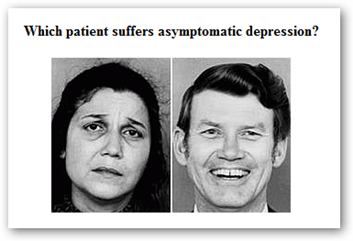This is just way too funny and I felt this needed to be shared! With all the ridiculous commercials that run on TV and that are shown on the internet today you sometimes wonder are suggestive methodologies being used? I am not reducing the fact here at all that mental illness is real and that there are people who do need help, but how far is drug marketing pushing the envelope with beating us over the head with advertising and how much more of this can we tolerate with constant media displays every day, and everywhere you turn around.
I am not reducing the fact here at all that mental illness is real and that there are people who do need help, but how far is drug marketing pushing the envelope with beating us over the head with advertising and how much more of this can we tolerate with constant media displays every day, and everywhere you turn around.
When a doctor is diagnosing depression there’s a short term stage of this that has to do with a “situation” or surrounding, and when that is removed, so goes the depression, so if healthcare reform can properly take place, think we might stand a chance on defeating Asymptomatic Depression?
Do you think any of our leaders may be suffering too? Here are a few of the highlights from the study from Bonkers Institute and you can read the full article too. Hat’s off for this one, it is funny and yet at the same time pokes a bit of fun in how we are perhaps sometimes letting analytics go to our heads! The link below has a good video with some additional great humor.
Despondex – Finally a Cure for Irrationally Happy People!
The picture at the bottom asks which one do you think is suffering from Asymptomatic Depression (grin). You may be surprised at the answer. Symptoms are outlined too so maybe you can see if a friend happens to be exhibiting any of the signs, be a friend, help a friend and be on the watch for those happy people who may be in danger (grin). BD
Methodius Isaac Bonkers, M.D., Principal Investigator
Bonkers Institute for Nearly Genuine Research
In recent years, antidepressant sales have skyrocketed beyond the pharmaceutical industry's wildest dreams. Yet despite widespread screening programs and aggressive marketing campaigns designed to raise mental health disease awareness, a significant percentage of the population remains undiagnosed and untreated. Estimates vary, but research suggests nearly a third of American adults have never been diagnosed with any mental disorder. Precisely this segment of the population must be targeted for intervention if pharmaceutical profits are to continue rising at their current rate.
One way to increase the prevalence of a disease is to broaden its diagnostic criteria. By providing physicians with an ever-growing laundry list of signs and symptoms to evaluate (insomnia or oversleeping, poor appetite or overeating, constant crying or inability to cry, apathy or hostility, fatigue or restlessness, and so on), the number of potential clients/patients is greatly expanded. However, a major flaw in this strategy is that it focuses exclusively on those who complain of sickness, while completely overlooking those who feel well. The present article explores the novel hypothesis that patients who feel well are, in fact, patients who need treatment.Understanding depression and its causes
Depressive disorders often co-occur with anxiety or substance abuse and are a leading form of disability in the United States. Depression may strike any time without warning. Researchers have identified four primary causes of mild, moderate and severe clinical depression:
1. Imbalance of key neurotransmitters in the brain;
2. Chronic low-grade hopelessness generated by early childhood trauma;
3. Sudden realization of the essential absurdity of life;
4. Ecological catastrophe on a scale never before seen in human history.
Other factors which might trigger a depressive episode include:
* having either too much or not enough of something;
* being trapped in an utterly hopeless situation with no way of escape;
* remorse, guilt, shame, failure, disappointment, grief, pain or loss of some kind;
* omega-3 deficiency from not eating enough cauliflower;
* infestation of household pests such as termites or rodents;
* leaky faucet, clogged drain or similar plumbing problem;
* global economic collapse, thermonuclear war, mass starvation, genocide, etc.Recognizing signs and symptoms
Familiar signs and symptoms of chronic clinical depression are easily recognized:
* slumped shoulders;
* downcast eyes;
* inability to concentrate;
* tendency to see the glass as half empty;
* hasn't dusted behind the refrigerator in months;
* worries about stuff like nuclear proliferation, mounting budget deficits and the legacy we're leaving our children.
Only a trained medical professional can properly identify the subtle signs of asymptomatic depression:
* rosy cheeks;
* sparkling eyes;
* sunny disposition;
* optimistic about the future despite all evidence to the contrary;
* invariably sees the glass as half full;
* doesn't mind if the glass contains deadly bacteria and toxic chemicals.
Asymptomatic Depression: Hidden Epidemic and Huge Untapped Market
Hat Tip: Pharmagossip (great find)




0 comments :
Post a Comment